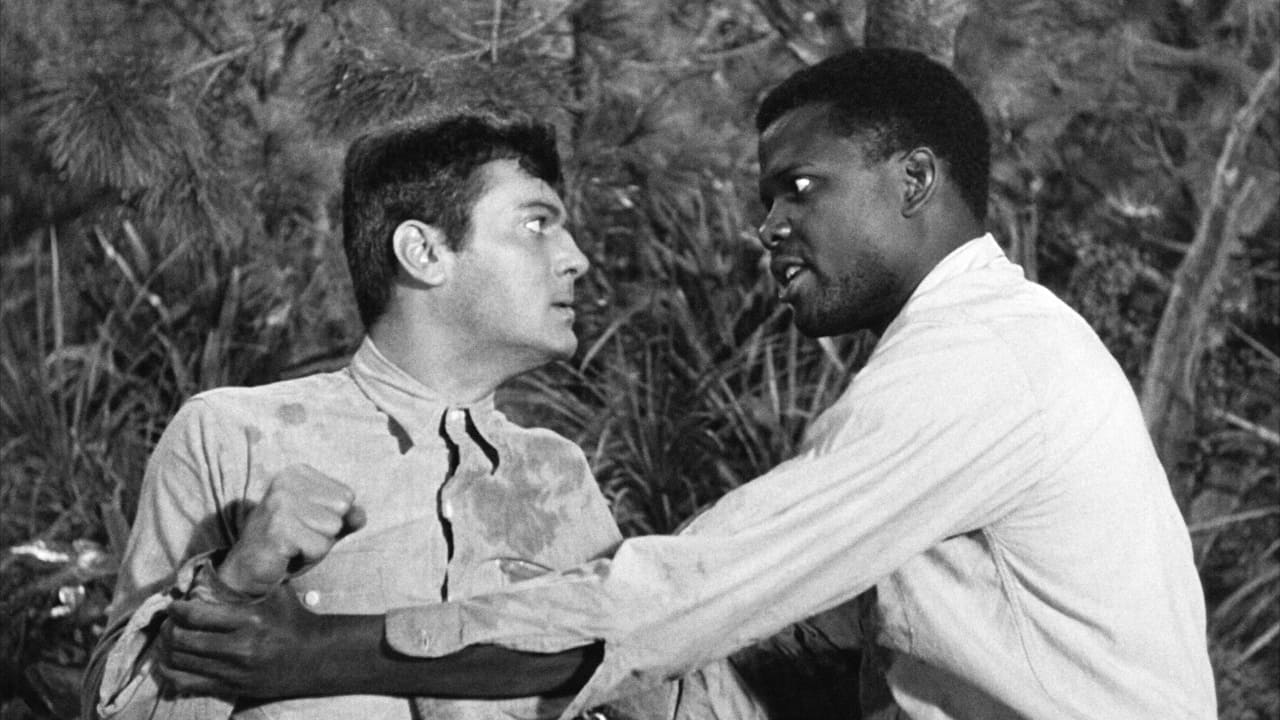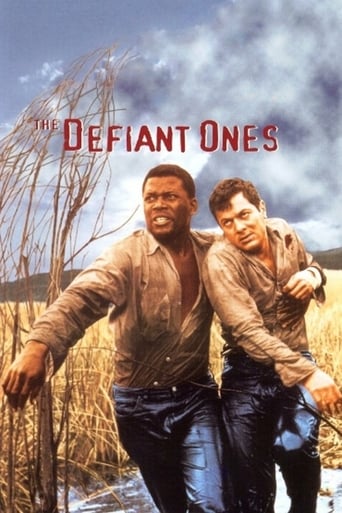

Don't Believe the Hype
... View MoreIt's fun, it's light, [but] it has a hard time when its tries to get heavy.
... View MoreAt first rather annoying in its heavy emphasis on reenactments, this movie ultimately proves fascinating, simply because the complicated, highly dramatic tale it tells still almost defies belief.
... View MoreAll of these films share one commonality, that being a kind of emotional center that humanizes a cast of monsters.
... View More"The Defiant Ones" gave me a whole lot more than I had expected. I always had thought this was a semi-sensational action film that exploited racism to attract notoriety. It actually is a poignant story of two men on the run who must cooperate in spite of their mutual animosity. The original screenplay by Nedrick Young and Harold Jacob Smith won the Oscar for 1958, and I am hard-pressed to think of a script more deserving of every accolade possible. Joker Jackson (Tony Curtis, a revelation) and Noah Cullen (Sidney Poitier, fierce and fatalistic) are chained together and are in flight from a posse of local deputies led by Sheriff Max Muller (Theodore Bikel) and State Trooper Capt. Frank Gibbons (Charles McGraw). The ongoing quarrels between the two pairs of mismatched partners throughout the film paints a vivid picture of life in the rural South of the 1950s. Bikel is simply stunning in his offhand performance as the humanitarian leader of the manhunt, and McGraw is unyielding in his determination to bring in the escapees swiftly and by any means necessary. Claude Akins is intimidating in a small role as the inhabitant of a work camp the prisoners stumble across. Lon Chaney Jr. dominates the screen during this passage, as we learn that he has good reason to empathize with Joker and Cullen (as Curtis calls Poitier). The duo ultimately seek refuge at the modest farm of an unnamed and abandoned single mother and her child. This portion of the film becomes a vignette straight out of a Tennessee Williams play, and the heat radiating from Cara Williams could warm an entire Arctic outpost.I cannot stress enough how fine the acting is by the entire cast. I have never seen Tony Curtis do such good work, and Poitier is excellent as always, with a a haunting mix of melancholy and mirth that is best displayed by his boisterous rendition of William C. Handy folk song "Long Gone" at key points in the movie. Cara Williams is riveting every second she is on screen, and Lon Chaney Jr. acts as a counterbalance to the casual prejudice of the other Caucasian characters. The various Southern accents are underplayed but lend authenticity to the dialogue, as do sundry colloquialisms they use. Stanley Kramer, a well-known social activist, directs the film without judgement, as the actions of the players speak for themselves. I cannot find a single flaw in "The Defiant Ones", and I have no choice but to give it the Highest Recommendation possible."I fill it up wit' dreams."
... View MoreJohn "Joker" Jackson (Tony Curtis), and Noah Cullen (excellent portrayal by Sidney Poitier), have escaped from prison and are shackled together. The story, well directed by message film director Stanley Kramer (see also the excellent "Ship of Fools", as well as his masterpiece "On The Beach" with Gregory Peck and Ava Gardner).At any rate, the film has some good scenes, they are in the brush and swamps of Georgia, trying to escape a pack of bloodhounds, and the Sheriff well portrayed by Theodore Bikel The fact that the way Poitier is treated , simply because he is black, is a time warp as when a woman offers the refugees food, but first asks Curtis if she "should give the other guy some as well". Tony Curtis is good in the role of a desperate malcontent, his accent a bit too NY but his acting usually overcomes this. He is angry at society, that he wants to be a "success". The dated phrase "Charlie Potatoes", humorously shows us the society of 1950's America and its values of what success means. Money, at any cost.The sheriff;s bounty hunter assistant has several bloodhounds and Dobermans "I hope you treat them dogs as go as your grandma" cracks Bikel. The dogs and how they are cared for (better than minorities and the poor) is a point of reference.Bikel as sheriff has a run in with Lon Chaney Jr., a man who lets the prisoners free from a town lynch mob. The seething anger and hypocrisies of small town America are well manifested here. Racism, ignorance, bigotry.This film was made in 1958, an important message. 10/0
... View MoreStanley Kramer directed this racial drama that stars Tony Curtis as John 'Joker' Jackson and Sidney Poiter as Noah Cullen, two convicts on a chain gang chained together who escape after the truck carrying them has an accident. They flee into the woods, where at first their mutual hatred makes it difficult to get along(and evade recapture). However, over time, as they must cooperate, they develop a mutual(if grudging) respect for each other, even as they are intercepted by vigilantes(led by Claude Akins) who want to hang them, especially Noah, but with the help of a friendly local(played by Lon Chaney Jr.), they are freed, but when Joker meets an attractive single mother, he is tempted to part with Noah, especially when their chain is literally broken... Good drama with fine acting and direction, though loses some credibility toward the end, which is also quite abrupt!
... View MoreIf Douglas Sirk truly was the king of melodrama, then Stanley Kramer must have been the prince. In the 1960's he made films, dealing with controversial issues: racial prejudices (Guess Who's Coming to Dinner, 1967) and conservative Christianity vs. liberal science (Inherit the Wind, 1960). Although, both of the films were powerful cuts into the core of the American society, they were still strongly characterized by comedy. However, in the 1950's, he made even more fierce films which relayed a desolate and melancholy world view: On the Beach (1959) is a story about a group of people who have escaped to Australia from a nuclear disaster, only to wait their inevitable death. The Defiant Ones (1958) is far from the former's hopelessness but it also presents a dark world and people, without idealistic illusions. In both films, people are dissatisfied and unheroic, and only a small dose of optimism is given, not to the characters, but to us.Unlike On the Beach, The Defiant Ones was a great success. It won two Oscars and is today considered as a major American classic. It was a dive into racism that reigned America during the time but also to an important moment of transition. Old values and absolute morality were questioned as the new generation grew up and, for the first time, youth culture was born. But that's another story. In The Defiant Ones Kramer was able to approach the American society and its people without illusions or formal idealism. The story of two different men, chained together, is really a picture of lonely people stuck in their desolate existence.The visual aesthetics reinforce the film's contents which are characterized by the existentialism of the 1950's: mud, pits, ditches, wet surfaces, run-down towns and rail ways, rivers and woods. The title of the film "The Defiant Ones" indicates to the men, chained together, but it also draws a wider picture of society. The men aren't really the defiant ones but the people around them are. The muddy landscapes, and especially the scene where the men fall to a pit, relay an emotion of stagnation. There is no destiny but as if the choices of the characters are inevitable and predetermined; already in the beginning we know that no salvation or any bright future awaits them. People are lonely and that hole they try to fill with hopes and dreams. Because it is all they have. Their lives are meaningless, there is no God or deliverance for them. No higher purpose. Just unbearable loneliness.However, loneliness doesn't just characterize the lives of these two characters as it can be seen everywhere in the society: one man who helps the police dotes his life on his dogs, the woman lives without friends or a lover, and the man in the village feels more connected with the criminals than with his fellow men. People have no future, which the swamps and mud highlight, they can only dream. But optimism won't last forever. Only love can save them for a short while from complete desperation and anxiety.Even though The Defiant Ones is a desperate film it is also, paradoxically, compassionate and funny. The ending proves that there is still hope because Curtis wins over his paragon. The thesis of the film could be that racism and all intolerance are just forms of fear. But it's just one of the film's many themes as it also brilliantly depicts existentialist agony: "What a way to live: to be quiet your whole life and only make noise when you die." To the lives of the protagonists Kramer has projected his idealized picture of the world which is still marked by loneliness and darkness. He seemed to understand that there is no eternal bliss. It's a dark picture but honest.
... View More